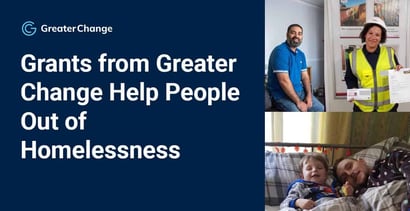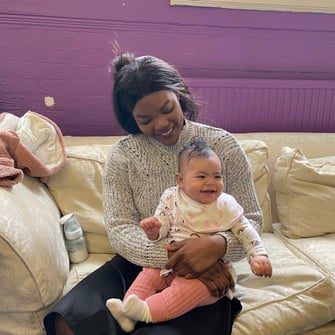
In a Nutshell: Scenes of people living on the streets or in shelters create stereotypes around homelessness as an unsolvable problem. As daunting as those scenes are, the majority of people without housing or the threat of losing it are competent to take care of themselves and simply need a financial boost to move forward. In the UK, Greater Change partners with existing charities that refer clients for cash grants. Greater Change instigates a fundraising campaign and transfers money directly to the client’s support team. It’s a model worthy of emulation that has helped more than 900 UK residents get back on their feet since 2018.
Homelessness is an increasingly widespread reality in developed nations. In the UK, the number of homeless households increased 32% from 227,000 in 2020 to about 300,000 in 2023, according to the advocacy agency Crisis.
People without a fixed residence impact the UK’s healthcare, criminal justice, and social services systems. In 2020, the government spent an estimated 1.2 billion pounds — or $1.5 billion — on temporary accommodations for homeless households, according to the tenant rights charity Shelter.
That public impact doesn’t take into account the dehumanizing effects of homelessness on people without housing. Stigmas around homelessness arise because many homeless individuals struggle with mental health and substance misuse issues that keep them on the streets in conditions of precarity.

But most homeless people aren’t in those states. Most have competencies to survive and thrive. What they lack is a relatively minor financial infusion, coupled with holistic support to prevent a spiral into crisis and help them regroup and recover.
Greater Change is making inroads in alleviating the UK’s homelessness crisis because it seeks to provide the infusion while others offer the support. Social workers at existing charities refer clients they work with to Greater Change, which provides a small, unconditional cash grant the social worker then uses to purchase needed products and services on the client’s behalf.
By giving no-strings-attached cash directly to those who need it most, Greater Change replaces the strictures of conditional assistance with support that respects the humanity and agency of the recipient. Greater Change has helped more than 900 people out of homelessness since 2018.
“Society tends to blame individuals who are homeless for becoming homeless and then give them no autonomy at all in the way to move out,” said Oliver Walsh, Growth Manager at Greater Change. “We trust that they know what they need.”
Partnerships Provide Wraparound Support
In 2018, Oxford University students Alex McCallion and Jonathan Tan were volunteering with a local homelessness charity, Aspire Oxfordshire, when they got the idea for Greater Change.
They experienced the crisis around them firsthand, but in speaking with clients at Aspire, they realized that although a multitude of reasons kept people from maintaining permanent housing, most had to do with cash flow, not debilitating mental health or substance misuse issues.
For example, they lacked money for rent deposits or job training or to clear rent or utility arrears to stay in their apartments or homes.

McCallion and Tan were also influenced by burgeoning research from developing countries demonstrating the success of unconditional cash transfers in bringing people out of poverty. GiveDirectly’s work on universal basic income in Kenya exemplified that.
Tan and McCallion crowdfunded a small pilot project to help about 20 people. The positive results convinced them unconditional cash grants could work in the UK.
“Last year, we supported more than 200 people, and about 86% maintained their move out of homelessness six to 12 months on,” Walsh said.
It’s a deceptively simple concept only if you assume that homeless people or those at risk of becoming homeless need a lot of hand-holding. To be sure, Greater Change works with selected referrals from experienced charities, but those individuals are in the mainstream when it comes to homelessness in the UK.
That said, clients also receive wraparound support from the charities working with them. Greater Change could have frontline social workers, but it chooses to work with charities that have been doing it for decades.
“People who are homeless often say they feel like a parcel passed between different services with no control,” Walsh said. “We build on social workers’ existing relationships with their clients.”
Client-Led Process Respects Personal Agency
Referrals happen when social workers determine a slight financial boost can have a transformative impact. For example, the government won’t allow people to move into unfurnished social housing for child safety reasons. Greater Change steps in when people looking to move from inadequate temporary housing into unfurnished social housing lack the funds to furnish it.
“They’re given social housing with no way to move into it without a financial boost, which makes no sense,” Walsh said.

That’s one of many reasons a social worker refers a client to Greater Change. Many clients come to the agency lacking funds to purchase national identity cards. Others need laptops to learn skills and apply for jobs. One client came to Greater Change in need of funds to retake an exam.
“It’s a client-led process — part of the reason we think what we do works is we’re very flexible,” Walsh said. “We have a very light touch in terms of conditionality. People can apply for anything.”
That doesn’t mean no holds are barred. On the contrary, Greater Change sense-checks all applications to ensure a transformative, sustainable impact.
For example, if the task is to clear a client’s rent arrears, the goal is to ensure they won’t fall behind again. Say a person accumulates 2,000 pounds ($2,552) in past-due rent because they’ve been out of a job for two months and received an eviction notice. Greater Change might step in to clear those arrears if they’ve secured another job and can pay their rent from then on because that’s sustainably going to stop them from becoming homeless.
“We transfer money directly to their social worker, who then goes and purchases the item,” Walsh said. “We do that to prevent clients from losing government benefits and ensure the money goes to what donors want to pay for.”
Transformative, Sustainable Impacts Smash Stereotypes
Greater Change receives direct support from individual donors, grants from philanthropic foundations, funding from corporate partnerships, and public funding from local councils.
Considering the UK’s relatively devolved administrative structure pertaining to homelessness, tight control over the distribution model eases the minds of local council representatives and keeps public support coming in.
So does the ROI on their investment, which counters stereotypes and stigmas around homeless people.

“The key pushback we get is that if you give someone money for a laptop or a sofa, they’ll just use it to buy drugs and alcohol,” Walsh said.
Walsh said that argument is one of the key challenges the team has faced in scaling its model and a key challenge for those inspired to scale a similar model in a different country. Data in the Greater Change Impact Report 22/23 refutes it in ways consistent with the research that initially inspired McCallion and Tan.
The Impact Report establishes that the UK government spends between 15,000 and 20,000 pounds (or between $19,000 and $25,565) per person per year on temporary accommodations.
Increased use of health services, including massive implications for the long-term health and life expectancy of homeless individuals, add to the burden. The use of the criminal justice system takes a toll, as does the use of social services.
Those expenses result in total annual public costs for each homeless case of 35,177 pounds ($44,969). Greater Change spends an average of 1,319 pounds ($1,685) to support each individual. That means its model unlocks potential cost savings per person of 33,858 pounds ($43,264) per year.
The number of individuals directly impacted is too small to make that data irrefutable. Greater Change plans a local implementation at scale to produce a clear, measurable impact on local council authority expenses. Also on the horizon is a randomized control trial to directly prove the impact.
“It will be a world-leading piece of research to show that our work is effective and scalable,” Walsh said.




